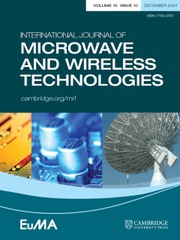Design of ramp-time current control with dynamic fuzzy bandwidth for wireless power transmission
Published online by Cambridge University Press: 14 August 2015
Abstract
This paper presents a novel experimental simulation of ramp-time current control with fuzzy bandwidth for wireless power transmission (WPT) systems. A fuzzy logic control algorithm was designed based on the structure of ramp-time current control in active power filters through simulation of ramp-time bandwidth variation to dynamically adjust the loop width of the ramp-time comparator. Ramp-time current control is the most suitable over other current control techniques and is thus selected for the experiment. Implementation of this approach prevents over-limit of switching frequency and enhances dynamic responses, resulting in long lifespan of power switches and smooth output for WPT systems. Finally, the hypothesis and simulation results were verified by analyzing the prototype model and experiment results.
Information
- Type
- Research Papers
- Information
- International Journal of Microwave and Wireless Technologies , Volume 8 , Issue 8 , December 2016 , pp. 1173 - 1182
- Copyright
- Copyright © Cambridge University Press and the European Microwave Association 2015
References
REFERENCES
- 1
- Cited by

